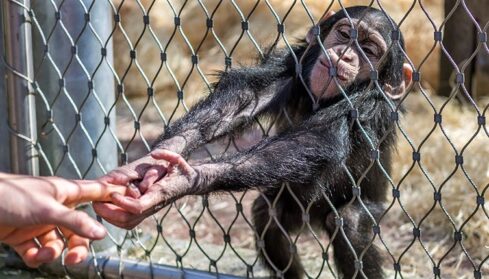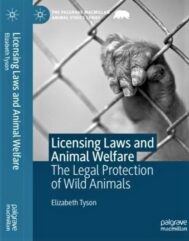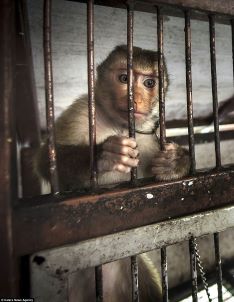Animal Welfare…
“National Laws are Badly Failing Wild Animals,” Reveals Wildlife Advocate in Newly Published Book. It’s Time To Outlaw Animal Captivity! Free Them!

LICENSING LAWS & ANIMAL WELFARE: The Legal Protection of Wild Animals by Dr Liz Tyson – Book Review.
“Most folks would agree that family pets should not be kicked. And elephants should not be beaten with pitchforks. Yet views on the extent to which animals should be protected from the actions of people are still the cause of much debate.” Dr Elizabeth Tyson, from the introduction to her new book.
For all our valiant efforts, the widespread destruction of our wildlife continues on a worldwide scale. Poachers continue to decimate endangered species for profit. Trophy hunters continue to use cruel government-sponsored “hunts” to kill big animals for thrills. Hired thugs continue to capture wild animals for corporate and private clients.
Animal Welfare: Zoos and travelling circuses still exist.
Even in America, government institutions from President Teddy Roosevelt’s historic National Parks to President Richard Nixon’s wonderful Environmental Protection Agency (EPA) are now being compromised. Sad.
 In a press release, the animal advocacy group Born Free USA has announced the publication of an important study of national Animal Welfare laws, or the lack of them…
In a press release, the animal advocacy group Born Free USA has announced the publication of an important study of national Animal Welfare laws, or the lack of them…
LICENSING LAWS & ANIMAL WELFARE: The Legal Protection of Wild Animals is a new book by Dr Elizabeth Tyson of Born Free USA. She calls for reform in the way animal welfare is regulated. And argues that “current legislative approaches prioritize the needs of industries that exploit animals over and above the needs of the animals themselves.” [1]
“If we are genuinely concerned about the welfare of wild animals, outlawing their keeping in captivity is the only way to ensure that their needs are meaningfully met,” Dr Tyson writes.
While the research in LICENSING LAWS & ANIMAL WELFARE focuses largely on the regulation of zoos in Tyson’s native England, she says that the findings are applicable globally. England is a country which prides itself on its progressive animal welfare laws. Yet her work discovered that zoos in England were found to have breached relevant laws on almost 2,000 occasions during the study period between 2008 and 2019.
Despite this, only 18 instances of correct enforcement action were carried out by government officials. A similar model of licensing is used to regulate zoos in the U.S., and Tyson points out that similar issues can likely be found stateside.
Tyson highlights the weaknesses in using licensing systems to assess and ensure animal welfare.
She argues that inspections are frequently little more than a rubber-stamping exercise. Some inspections “intended to establish the level of care provided to thousands of animals are carried out over a single working day, or less.”
“Laws that are, ostensibly, designed to protect animals invariably contain caveats, which allow for their continued exploitation,” Tyson says.
“Animals are rarely truly protected.
“Whether that be due to exemptions such as those in the U.S. Animal Welfare Act. Which simply omit entire species of animal, such as mice and birds used in research. As well as farmed animals.
“Or those such as the U.K.’s overarching animal welfare law, which explicitly allows practices such as chopping off birds’ beaks or parts of their wings without the use of anesthesia.”
Tyson argues that “if society is serious about protecting animals, laws must be designed with the specific needs of those animals in mind. Rather than the current model of molding legislation around the needs of the industries that use animals. If we were to approach regulation of animal welfare in this way, it’s likely that we would have to accept that many species of wild animals cannot be held captive and have their welfare needs met.”
Tyson goes on to explain that “Wild animals have not been domesticated over millennia in the same way that, for example, dogs have. As such, they are genetically unchanged from their free-living cousins.
“When kept in captivity, it is impossible for all, and sometimes any, of their welfare needs to be met.”
“I believe our lawmakers should be pioneering approaches which move away from the principle of animals as ‘commodities,’ towards considering them as individuals with needs which matter, and regulating for their protection accordingly.”
“The plight of wild animals in captivity is at the very heart of our work at Born Free USA,” added Angela Grimes, CEO of the organization. “We are very pleased to have Dr Tyson leading our programs to protect wildlife and applying her research to campaigning against captivity in the U.S. We congratulate her on this wonderful achievement.”
LICENSING LAWS & ANIMAL WELFARE: The Legal Protection of Wild Animals, ISBN 978-3-030-50042-9, is available at Springer.com/Licensing Laws and Animal Welfare
May We All Live Free, Mon Ami! – Brian Alan Burhoe
Do you agree with this Post?
 IF SO, YOU MIGHT WANT TO READ WOLFBLOOD — MY MOST POPULAR ANIMAL STORY:
IF SO, YOU MIGHT WANT TO READ WOLFBLOOD — MY MOST POPULAR ANIMAL STORY:
“I JUST READ WOLFBLOOD AGAIN FOR GOOD MEASURE. ONE FOR ANY WOLF LOVER. ENJOYED IT BUT WISH IT WAS A FULL LENGTH NOVEL.” – Gina Chronowicz @ginachron
“GREAT SHORT STORY! DOES REMIND ME OF CALL OF THE WILD, WHITE FANG…” – Evelyn @evelyn_m_k
A “captivating and affectionate” tale in the Jack London Tradition of a solitary Gray Wolf and it’s longing for a place in the far-flung Northern wilderness. FREE TO READ ==> WOLFBLOOD: A Wild Wolf, A Half-Wild Husky & A Wily Old Trapper
To learn more about Born Free USA and its ongoing battles to save our Wildlife, See What is Trophy Hunting? Facts & Fiction Re Killing Wildlife for Sport
[1] About Dr. Liz Tyson: “Dr. Liz Tyson is Programs Director for Born Free USA. She is based in Texas, U.S. And is responsible for the management of the Born Free USA Primate Sanctuary. Where over 450 individual non-human primates are cared for following rescue or re-homing from the pet trade, zoos, or vivisection.
Elizabeth was awarded her PhD in Animal Law from the University of Essex, United Kingdom. This in 2018 just prior to relocating to the U.S. to take up her current role. Her doctoral research addressed the efficacy of regulatory licensing regimes as a means of protecting animals in captivity, particularly in zoos, in the U.K. This work was updated and published in 2020 in the book LICENSING LAWS & ANIMAL WELFARE: The Legal Protection of Wild Animals.”
Her Animal Welfare Published Works:
“Liz has worked for over 16 years in the NGO sector, focusing in large part on the conservation and care of non-human primates and as a campaigner on issues surrounding the captivity of non-domesticated animals.
 “Her publications include: SPECIESISM AND ZOOS: Shifting the Paradigm, Maintaining the Prejudice in The Palgrave Handbook of Practical Animal Ethics (Palgrave Macmillan, 2018).
“Her publications include: SPECIESISM AND ZOOS: Shifting the Paradigm, Maintaining the Prejudice in The Palgrave Handbook of Practical Animal Ethics (Palgrave Macmillan, 2018).
THE HARMS OF CAPTIVITY WITHIN LABORATORIES AND AFTERWARD: The Ethical Case Against Animal Experiments (University of Illinois Press, 2018).
MAKING IT UP AS THEY GO ALONG: Marius and the Zoo Industry’s Inconsistent Approach to Self-Regulation, Journal of Animal Welfare Law, March 2014. FOR AN END TO PINIONING: The Case Against the Legal Mutilation of Birds, Journal of Animal Ethics, Spring 2014. And REGULATING CRUELTY: The licensing of the use of wild animals in circuses, the Journal of Animal Welfare Law, January 2013.”
Source: Born Free USA, PR Newswire & Civilized Bears.
LICENSING LAWS & ANIMAL WELFARE: The Legal Protection of Wild Animals by Dr Liz Tyson – Book Review.
Animal ethics, animal experiments, animals in the wild, animal welfare, baby chimps, baby chimpanzees, book review, Elizabeth Tyson. Dr Liz Tyson, endangered species, legal protection wild animals, licensing laws, pinioning, Speciesism, wild animals, wildlife.












